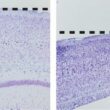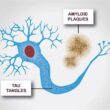Age-Related Risk Factors Alzheimer’s Disease
The Unavoidable Advance of Age: Risk Factors Associated with Alzheimer’s Disease
Alzheimer’s disease (AD) is a neurological condition that worsens over time and gradually impairs a person’s ability to think clearly, remember things, and eventually do even simple everyday tasks. The greatest recognised risk factor for Alzheimer’s is getting older, yet the specific aetiology of the disease is still unknown. This blog post examines the intricate connection between ageing and how it affects the course of Alzheimer’s disease.
Table of Contents

Age and Increased Risk: The Stats Speak for Themselves
Age-Related Risk Factors Alzheimer’s Disease
In other words, your chance of Alzheimer’s disease increases with age. Though it can strike anyone at any age, older folks are significantly more likely to have it:
- Every five years after the age of 65: the chance of Alzheimer’s disease doubles.
- 85 years of age and beyond: In this age range, around one-third of people may develop Alzheimer’s disease.
These figures demonstrate how important ageing is to the course of the illness. However, why does ageing make one more susceptible to Alzheimer’s?
Exposing the Biological Connection: Brain Alterations with Age
Age-Related Risk Factors Alzheimer’s Disease
Our brains naturally alter in certain ways as we get older. While not necessarily harmful, some modifications could raise the chance of developing Alzheimer’s disease:
- Cellular Senescence: The characteristic of Alzheimer’s disease, beta-amyloid accumulation, causes brain cells to become less effective.
- Chronic Inflammation: As we age, we frequently experience low-grade inflammation in the brain, which can harm brain tissue and speed up the ageing process.
- Vascular Damage: As we age, our blood vessels become less healthy, which may limit blood flow to the brain and make it more difficult for nutrients and oxygen to reach there.
- Neurotransmitter Disruptions: Cognitive decline may be exacerbated by age-related changes in the synthesis and activity of neurotransmitters, such as acetylcholine, which is crucial for memory and learning.
These aging-related changes can increase the risk, although Alzheimer’s disease is not always the result of them.
Beyond Age: A Complex Environment of Risk
Age-Related Risk Factors Alzheimer’s Disease
While age is a big risk factor, it’s not the only one. A person’s total risk of Alzheimer’s disease is influenced by a number of additional factors that interact with age:
- Genetics: A family history of Alzheimer’s disease raises your risk, particularly if a close relative got the illness when they were younger.
- Lifestyle Decisions: A poor diet, physical inactivity, and smoking are unhealthy habits that can increase the risk of Alzheimer’s disease by exacerbating the effects of age-related brain changes.
- Long-Term Medical Conditions: Diabetes, hypertension, and high cholesterol are a few diseases that might aggravate vascular damage and inflammation, which may raise the risk of Alzheimer’s.
Techniques for Reducing Age-Related Risk: Encouraging Mental Wellness
Age-Related Risk Factors Alzheimer’s Disease
Although time cannot be stopped, there are strategies to support cognitive health and maybe lessen the impact of ageing on the risk of Alzheimer’s disease:
- Sustaining a Healthy Lifestyle: For general health, including mental health, it’s important to eat a balanced diet, exercise frequently, and get enough sleep.
- Managing Chronic disorders: Reducing inflammation and vascular damage can potentially provide some protection when chronic health disorders like high blood pressure and diabetes are kept under control.
- Cognitive Stimulation: Engaging in mentally demanding activities such as brain-training games, language acquisition, and social interaction can support the maintenance of cognitive function.
Age-Related Risk Factors Alzheimer’s Disease
While these tactics might not completely stop Alzheimer’s, they can improve general wellbeing and possibly postpone the onset or decrease the disease’s course.
In summary: age is a risk factor rather than a guarantee.
Age-Related Risk Factors Alzheimer’s Disease
Age is the single biggest risk factor for Alzheimer’s disease, which is a complicated disorder. Age-related alterations do not, however, always result in Alzheimer’s disease. By being aware of the biological connections and the ways in which risk factors interact, people can take control of their health and possibly lessen the negative effects of ageing on their cognitive function. By making brain health a top priority throughout life, we can foster cognitive wellness and cultivate a more positive future vision.


